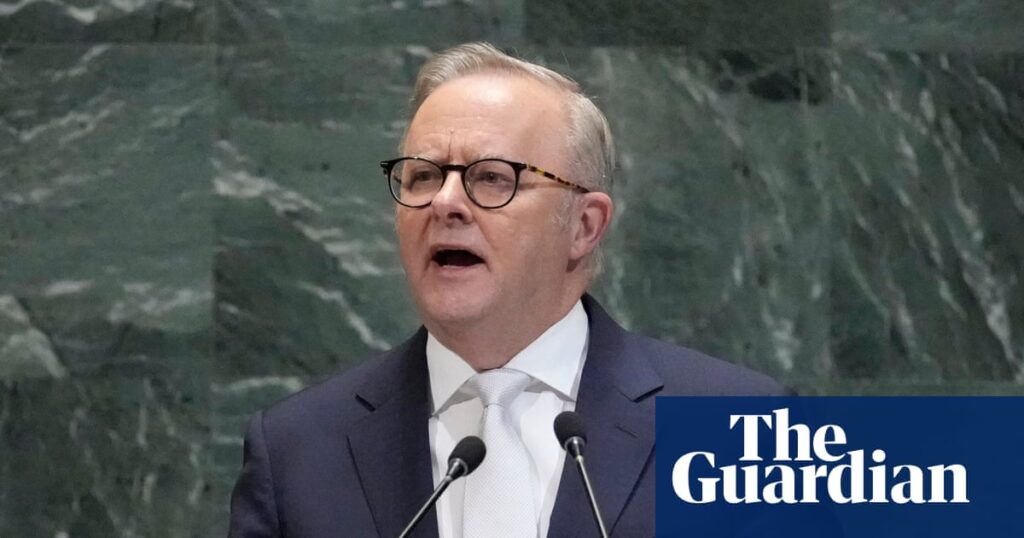
Of all the titles conferred on Anthony Albanese, “statesman” might be the one that comes least naturally. Nearly three decades as a member of parliament, Labor leader since 2019, and over three years as prime minister, Albanese cautiously re-entered the global stage this week, addressing the UN General Assembly for the first time.
In a world beset by conflict and political upheaval, the prime minister joined international leaders in recognizing Palestine’s sovereign statehood, advocated for Australia’s ambitious 2035 climate targets, and urged nations to implement a social media ban for children under 16. The 80th session of the General Assembly, featuring leaders from 140 countries, was a melting pot of activists, protesters, and journalists. While the US president’s aggressive rhetoric dominated headlines, it underscored the growing divide with leaders like Albanese.
Climate Change: A Global Priority
At a special climate meeting convened by the UN Secretary-General, Albanese pledged that Australia would “do more than just guard against the very worst,” emphasizing that no nation could tackle climate change alone. Later, at a New York Times conference, he urged China to accelerate its efforts to reduce emissions, including curbing new coal-fired power stations.
A glossy profile in the New York Times lauded Australia as “the country pushing through climate partisanship.” Albanese acknowledged the domestic anti-net zero debate, while detailing cooperation with Pacific nations and presenting climate change as an economic opportunity for the world’s 14th largest economy. Contrasting with former US President Donald Trump’s dismissal of climate change as “the greatest con job ever perpetrated,” Australia is seen as moving in the right direction, bolstered by the government’s parliamentary majority.
“This is the decisive decade for acting on the environmental challenge of climate change,” Albanese stated, “and seizing the economic opportunities of clean energy.”
Australia’s Bid for COP31
Albanese is advocating for Australia to host the COP31 summit in Adelaide next year, a joint project with Pacific Island countries. However, Turkey’s rival claim poses a challenge. Climate Change and Energy Minister Chris Bowen was seen on Manhattan’s Upper East Side, appearing alongside Turkey’s First Lady, Emine Erdoğan, a key figure in Turkey’s bid. Albanese’s request to meet Turkish President Recep Tayyip Erdoğan remains unanswered, pushing the decision closer to the default option of Bonn, Germany.
Domestically, the political debate may not fully credit Albanese and his team for their international climate efforts, despite growing recognition abroad. Bowen describes COP31 negotiations as “a work in progress.”
Strengthening International Relations
After a well-attended event on the social media ban, Albanese and European Commission President Ursula von der Leyen exchanged praise. Australia is negotiating a new defense and security agreement with the EU, alongside a delayed free trade deal. “When it comes to the EU-Australia relationship, there is no distance between democracy,” von der Leyen remarked. “The same goes for good ideas.”
In his UN address, Albanese revived Australia’s bid for a temporary seat on the UN Security Council in 2029-30, a plan first announced by Julie Bishop in 2015. Foreign Affairs Minister Penny Wong has been quietly advocating for this bid, which currently faces no competition from other candidates.
Looking Ahead: London and Beyond
Albanese is set to visit London, meeting UK Prime Minister Keir Starmer and Canadian figure Mark Carney. This coalition of progressive leaders aims to discuss cooperation amidst a global shift to the right, with concerns about immigration, housing costs, and economic stability at the forefront. The discussions will focus on building alternative power bases, not opposing the US.
While in the UK, Albanese will also meet with Tony Blair and King Charles. The prime minister’s week at the UN General Assembly has been a diplomatic success, but the challenge remains to transform his foreign policy vision into reality.
Statesmanship may prove more challenging than domestic politics, yet Albanese’s efforts on the global stage mark a significant step in his leadership journey.







